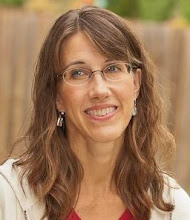But we had beautiful "Indian summer" days last week, and I just ran across this poem that eloquently expresses how I feel about summer's end:
by Emily Dickinson
These are the days when birds come back,
A very few, a bird or two,
To take a backward look.
These are the days when skies put on
The old, old sophistries of June, -
A blue and gold mistake.
Oh, fraud that cannot cheat the bee,
Almost thy plausibility
Induces my belief,
Till ranks of seeds their witness bear,
And softly through the altered air
Hurries a timid leaf!
Oh, sacrament of summer days,
Oh, last communion in the haze,
Permit a child to join,
Thy sacred emblems to partake,
Thy consecrated bread to break,
Taste thine immortal wine!
The last six lines piqued the interest of the Anglican and the literature minor in me, so I looked up Emily Dickinson's religious beliefs. (Oh, the wonder of the internet, that we can have our curiosities fulfilled at the click of a button!) She was a Puritan looking for something transcending its rigid theology, so she blended it with Transcendentalism, creating "a third alternative":
Elisa New suggests Dickinson's third alternative to religion is closely related to the ideas of Kierkegaard, a philosopher and theologian. Dickinson "is quite simply no longer able to conceive God in the sanguine, essentially 'centered' or logocentric terms Emerson borrows . . . from Augustine . . ." (New 4). For Kierkegaard, as for Dickinson, "the very nature of religious experience requires that we yield up our sense of God as centered in our world, yield up the logos or knit of Reason that makes God's order explicable through Revelation. Replacing the centre, then, is the 'unknown,' a limit distinctly outside the boundaries of what the mind can grasp . . ." (New 4). (emphasis mine) (from this article)I'm totally an amateur here, but I think Dickinson would have loved a more sacramental theology like Anglicanism, if she'd had the exposure. (The Church of England had little presence in Puritan New England, I gather.) This combination or "third alternative" sounds similar. And I'd rather read her poetry--which has always stirred me--through that lens than the Transcendentalist one.
Now I'm wondering about Kierkegaard....
But it's time to go encourage my kids to follow their own rabbit trails of interest!






